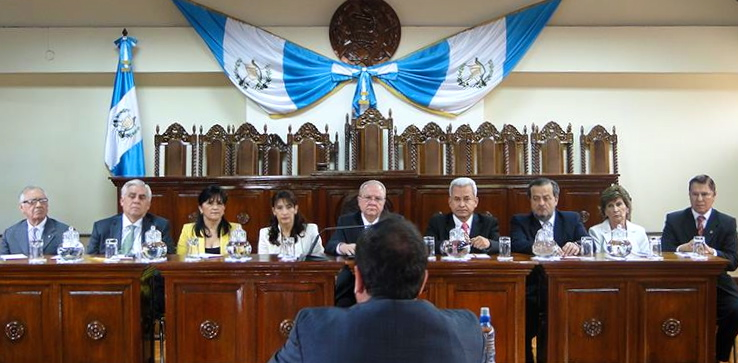
Español Guatemalan President Otto Pérez Molina announced recently that he would not request an extension for the mandate of the UN International Commission against Impunity in Guatemala (CICIG), a multilateral body charged with investigating the activities of illegal security networks. After seven years of existence, though, its continuation is not the chief concern, rather how its achievements and objectives can be secured effectively.
Taking on Criminality’s Deep Roots
The CICIG was created to provide technical assistance to investigate and prosecute criminal networks that had overrun the state’s capacity. Enabled by historical links to the military and government officials and the sheer fecklessness of Guatemala’s judicial institutions, these groups grew from small cells associated with petty crime in the 1980s to organized crime networks in the 1990s that partnered with international drug cartels.
When hotshot Spanish attorney Carlos Castresana parachuted in as CICIG’s first commissioner in early 2008, the conditions were unsustainable: “98 percent of homicides in the country go unpunished, and the cases which reach a resolution at court can be counted [on one’s] fingers.” After years of struggle and frustration, Guatemalan officials accepted their incapacity to deal with these illegal networks, in operation all across the territory, and decided to call for outside help.
Under Castresana, the commission took on high-profile cases, including corruption networks in the police and companies with links to government officials. Most famously, it took on the stranger-than-fiction case of Rodrigo Rosenberg, a lawyer who attempted to frame the president by arranging his own murder, and the closely related murder of businessman Khalil Musa and his daughter Marjorie. The commission also established a case against former-President Alfonso Portillo for embezzlement, though this did not reach a successful conviction until he was extradited to the United States and tried there for money laundering.
This initially explosive agenda prompted a backlash of allegations. According to the Guatemalan Counsel of Human Rights, the commission violated due process considerations, including when it held suspects in detention without a trial for years. The immunity granted in the CICIG’s mandate also sheltered it from public scrutiny — one of the commission’s key problems according to political analyst Pedro Trujillo.
Luckily, the commission evolved under the leadership of three different commissioners. With a lower profile under Castresana’s successor, Costa Rican attorney Francisco Dall’Anese, CICIG had a more fruitful collaboration with its local counterparts. Colombian attorney Iván Velásquez arrived as yet a third CICIG commissioner in 2014 and put a premium on the transfer of institutional capacities to local institutions, but the task is far from complete.
Impunity Won’t Go without a Fight
Looking ahead, it is obvious that the local institutions don’t have sufficient financial or technical capacities to carry the tasks performed by the commission, and they may also lack the will to secure hard-won achievements.
With international support, CICIG has been able to denounce touchy subjects, including illegal campaign funding and corruption among the judiciary. It has also played a role in drafting new laws against corruption and illicit enrichment. Partially because of its involvement, impunity has dropped 23 percent, and the office of the attorney general has become a more efficient public prosecutor.
Now that the president faces the narrow choice of extending the commission’s mandate or cutting it short, it would be best to think about the prospects for broader reform. All three commissioners have recognized the necessity of a thorough reform of the judicial system, but here lies the greatest irony of all: the very fragile state that recognized its incapacity to fight against impunity has played deaf to this important piece of advice. Such a judicial reform is an internal party CICIG has not been invited to.
Edited by Fergus Hodgson.
 Versión Español
Versión Español












